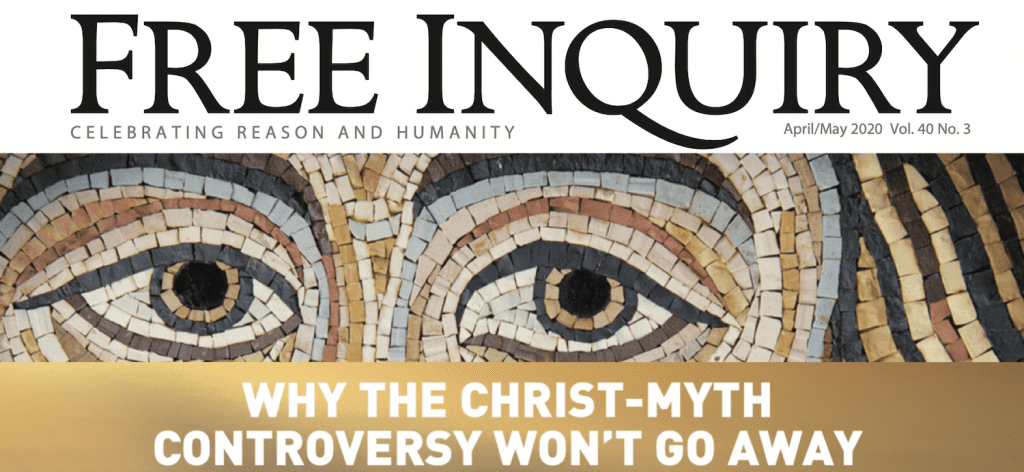By The Center for Inquiry
While atheists agree that Jesus could not possibly have been the son of an imaginary god, scholars continue to debate whether a historical Jesus ever existed at all. Just in time for Easter, the latest issue of Free Inquiry confronts the Jesus myth head-on, exposing the errors, inconsistencies, and absurdities that run through the Bible’s conflicting accounts of the life and deeds of a revolutionary and, ultimately, fictional figure.
“Recognizing that Jesus was a mythical son of God is not just an esoteric question debated by religious scholars,” writes Eugene D. “Duke” Mertz. “On the contrary, it is absolutely vital to properly understand and address the appeal of Christianity. While some of these ideas could be considered revolutionary, Jesus was not killed because of them.”

Mertz contends that disagreements and inconsistencies between and among the Gospels and Epistles should not be brushed aside.
“It makes no sense,” he writes, “that the Gospel writers should differ in their description of the Last Supper unless it never occurred.”
Mertz says there are no contemporaneous accounts of early Christians outside of the Bible, noting that centuries later, editors of the Gospels erroneously appropriated amalgamations of Greek and Hebrew deities and rites, treating them as the historical records of a single man.
Among the Bible’s internal inconsistencies is the notion that Jesus’s disciples would have abandoned him in his time of crisis. Loyalty is a subject well understood by retired police captain and leadership scholar Mark Cagnetta, and he finds Christ’s followers’ spinelessness implausible. How is it possible, asks Cagnetta, that after months of devotion to the miracle-working messiah himself, that these apostles would give new meaning to an old phrase: “When the going gets tough, the apostles get going . . . as far away as they possibly can!”
And if the story of Jesus is the result of exaggeration and embellishment, perhaps there is something to be learned from fishermen. Contributor Mark Kolson connects the stereotype of the exaggerating fisherman to the Jesus myth’s need for someone who could spread the news of alleged miracles, “not by marshaling evidence but by using deceptive language to persuade the public that Jesus was a god.” That figure was Peter, he who trammeled up 153 Jesus-conjured fish.
Also in the April/May 2020 issue of Free Inquiry: Center for Inquiry CEO Robyn Blumner shows how Attorney General William Barr is casting secular Americans as “enemies of the state;” Mohadesa Najumi recounts how discovering atheism allowed her to reclaim her personhood; Hannah Wallace contrasts Europe’s legacy of the Enlightenment with the continued existence of blasphemy laws; Gregory S. Paul offers hope that the 2020s will reflect the secularization of the “roaring” 1920s; and much more.
The April/May 2020 issue of Free Inquiry is coming soon, with both print and digital subscriptions available.
The Center for Inquiry (CFI) is a nonprofit educational, advocacy, and research organization headquartered in Amherst, New York, with executive offices in Washington, D.C. It is also home to the Richard Dawkins Foundation for Reason & Science, the Committee for Skeptical Inquiry, and the Council for Secular Humanism. The Center for Inquiry strives to foster a secular society based on reason, science, freedom of inquiry, and humanist values.
–
Comments welcome.
Posted on April 9, 2020


